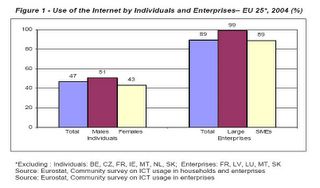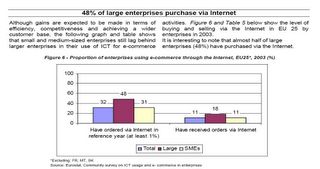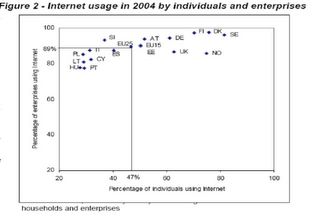The official statistics body of the European Union - known as
Eurostat - announced its 30 nation report on internet usage throughout Europe on Friday. Report author Morag Ottens, concludes "In most countries internet penetration has reached saturation point in large enterprises" - he also found that 48% of large European enterprises had purchased via the internet in 2004.
Key conclusions of the report are:- - Half of larger business buy via the internet
- Virtually all European business are connected - even in the weaker economies
- Small business are only marginally behind in their use of the internet
- Men are greater users than women but this is narrowing in the younger age gaps
- Broadband is rapidly becoming the method of choice for accessing the internet
- Higher educational levels use the internet more
- Younger age groups show internet usage more than double that of their grandparents
51% of men and 43% of women used the internet, as the chart below shows. Intriguingly, this gap is consistent across all countries with high and low penetrations of the internet with the notable exceptions of just Finland and Estonia where women are ahead across all age groups.
Large enterprises were 99% internet-connected - hence the 'virtual saturation' conclusion. Smaller businesses are marginally behind - except in the most active countries such as those in Scandinavia where they are almost alongside their larger colleagues. For large enterprises, only Estonia, Italy, Hungary, Norway, Bulgaria and Romania were below 99% - but even then the lowest figure was in Romania which still achieved 90%.
 Chart shows use of the internet by individuals and enterprises - click to view.
Chart shows use of the internet by individuals and enterprises - click to view.There is a 16% gap between large enterprises buying on the web (48%) and smaller businesses (32%) - Morag Ottens comments that this is despite the fact that "Gains are expected to be made in terms of efficiency, competitiveness and achieving a wider customer base".
 Chart shows large enterprise purchasing via internet - click to view.
Chart shows large enterprise purchasing via internet - click to view.The picture across the 30 nations varies only by degree with Scandinavian nations clearly in the lead for use by businesses whilst Germany, Austria, Estonia and the UK overtake Norway when consumers are considered to join the leading group of Finland, Denmark and Sweden .
Slovakia has an unexpectedly high figure of business use and Estonia is above average in terms of individuals. The tailing group in this study comprises of Italy, Spain, Poland, Czech Republic, Lithuania, Hungary and Portugal who are all below average on both business and consumer use.
 Chart shows internet usage by individuals and enterprises by country in 2004
Chart shows internet usage by individuals and enterprises by country in 2004
ConclusionsThe report is already out of date, of course, as we have seen rapid increases already in 2005. It also covers all use of the internet - as opposed to the web - but what it does do is give a very clear picture that Europe offers a very rich market to be targeted via the web. One group which should take particular notice is business-to-business marketers - who now have great export opportunities open to them whether they are large or small.
The report covers an interesting basket of 30 nations ranging from heavy web users - Scandinavia - to future members of the European Union - including Turkey. Non-members of the European Union such as Norway and Switzerland are also covered.
The full report is available from
Eurostat or you can
contact Web Certain who will be pleased to forward you a copy.








